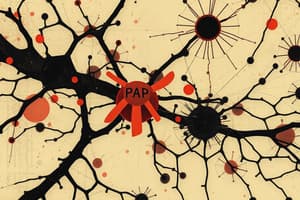Podcast
Questions and Answers
Which selectin is upregulated on vascular endothelial cells to facilitate neutrophil extravasation during inflammation?
Which selectin is upregulated on vascular endothelial cells to facilitate neutrophil extravasation during inflammation?
- Syndecan
- P-selectin
- E-selectin (correct)
- L-selectin
Integrins are covalently bound molecules that mediate cell adhesion to the extracellular matrix.
Integrins are covalently bound molecules that mediate cell adhesion to the extracellular matrix.
False (B)
What are hemidesmosomes?
What are hemidesmosomes?
Anchoring junctions that link extracellular laminin in basement membrane to keratins within epithelial cells.
Selectins are regulated by __________ mediators such as TNFα and histamine.
Selectins are regulated by __________ mediators such as TNFα and histamine.
Match the following adhesion molecules with their functions:
Match the following adhesion molecules with their functions:
What is the primary function of cell adhesion in multicellular organisms?
What is the primary function of cell adhesion in multicellular organisms?
Leukocytes exhibit stable adherence to the endothelial cells lining blood vessels.
Leukocytes exhibit stable adherence to the endothelial cells lining blood vessels.
What are the main types of cell junctions mentioned, and what is their purpose?
What are the main types of cell junctions mentioned, and what is their purpose?
Cell adhesion molecules such as __________ link to the actin cytoskeleton in adherens junctions.
Cell adhesion molecules such as __________ link to the actin cytoskeleton in adherens junctions.
Which type of junction is responsible for sealing gaps between epithelial cells?
Which type of junction is responsible for sealing gaps between epithelial cells?
Match the following cell adhesion molecules with their primary functions:
Match the following cell adhesion molecules with their primary functions:
Gap junctions allow for passage of small molecules and ions between cells.
Gap junctions allow for passage of small molecules and ions between cells.
What is the role of integrins in cellular adhesion?
What is the role of integrins in cellular adhesion?
What is the role of talin in integrin activation?
What is the role of talin in integrin activation?
Outside-In signaling occurs when a ligand binds to the integrin dimer, causing it to adopt an extended conformation.
Outside-In signaling occurs when a ligand binds to the integrin dimer, causing it to adopt an extended conformation.
What mediates cell-cell adhesion?
What mediates cell-cell adhesion?
In the absence of a ligand, the integrin dimer adopts a ______ structure.
In the absence of a ligand, the integrin dimer adopts a ______ structure.
Which statement about integrin pairs is correct?
Which statement about integrin pairs is correct?
Match the components with their roles in integrin activation:
Match the components with their roles in integrin activation:
Integrins are only involved in inside-out signaling.
Integrins are only involved in inside-out signaling.
What is the significance of focal adhesions in motile cells?
What is the significance of focal adhesions in motile cells?
Which of the following cadherins is responsible for Ca2+ dependent homophilic adhesion?
Which of the following cadherins is responsible for Ca2+ dependent homophilic adhesion?
All cell adhesion molecules are dependent on calcium ions.
All cell adhesion molecules are dependent on calcium ions.
What role do catenins play in cell adhesion?
What role do catenins play in cell adhesion?
The process by which circulating T cells home to lymph nodes involves interaction between L-selectin and __________.
The process by which circulating T cells home to lymph nodes involves interaction between L-selectin and __________.
What type of molecules are involved in small molecule transfer through gap junctions?
What type of molecules are involved in small molecule transfer through gap junctions?
The adhesive properties of cadherins are due to their weak individual affinities but strong collective interactions.
The adhesive properties of cadherins are due to their weak individual affinities but strong collective interactions.
Describe the role of selectins in neutrophil recruitment.
Describe the role of selectins in neutrophil recruitment.
The ___________ junctions are known for their ability to form a barrier that prevents leakage between epithelial cells.
The ___________ junctions are known for their ability to form a barrier that prevents leakage between epithelial cells.
Which adhesion molecule is known for being part of the Ig superfamily and plays a crucial role in T cell activation?
Which adhesion molecule is known for being part of the Ig superfamily and plays a crucial role in T cell activation?
All immunoglobulin family adhesion molecules mediate homophilic adhesion only.
All immunoglobulin family adhesion molecules mediate homophilic adhesion only.
How do cadherins contribute to cell segregation during embryonic development?
How do cadherins contribute to cell segregation during embryonic development?
Cyclic AMP and inositol trisphosphate are examples of __________ that can be transferred through gap junctions.
Cyclic AMP and inositol trisphosphate are examples of __________ that can be transferred through gap junctions.
What type of cell adhesion molecules allow neutrophils to roll along vascular walls?
What type of cell adhesion molecules allow neutrophils to roll along vascular walls?
Neutrophils have a strong adhesion due to stable connections with endothelial cells.
Neutrophils have a strong adhesion due to stable connections with endothelial cells.
Flashcards
Extracellular matrix (ECM)
Extracellular matrix (ECM)
The material surrounding cells in multicellular organisms. It provides structural support and mediates cell adhesion.
Cell adhesion
Cell adhesion
The process by which cells bind to each other or to the extracellular matrix (ECM).
Cell junctions
Cell junctions
Structures that connect adjacent cells, mediating cell-cell interactions and allowing for communication between cells.
Cadherins
Cadherins
Signup and view all the flashcards
Integrins
Integrins
Signup and view all the flashcards
Tight junctions
Tight junctions
Signup and view all the flashcards
Gap junctions
Gap junctions
Signup and view all the flashcards
Selectins
Selectins
Signup and view all the flashcards
Syndecans
Syndecans
Signup and view all the flashcards
Desmosomes
Desmosomes
Signup and view all the flashcards
Hemidesmosomes
Hemidesmosomes
Signup and view all the flashcards
Homophilic adhesion
Homophilic adhesion
Signup and view all the flashcards
Immunoglobulin superfamily
Immunoglobulin superfamily
Signup and view all the flashcards
Cell-cell adhesion at a synapse
Cell-cell adhesion at a synapse
Signup and view all the flashcards
Cell segregation
Cell segregation
Signup and view all the flashcards
Leukocyte rolling
Leukocyte rolling
Signup and view all the flashcards
Mucin
Mucin
Signup and view all the flashcards
Cell adhesion molecules
Cell adhesion molecules
Signup and view all the flashcards
Epithelial cells
Epithelial cells
Signup and view all the flashcards
Extracellular domains
Extracellular domains
Signup and view all the flashcards
Cytoplasmic domains
Cytoplasmic domains
Signup and view all the flashcards
Integrin Activation
Integrin Activation
Signup and view all the flashcards
Outside-In Signalling
Outside-In Signalling
Signup and view all the flashcards
Inside-Out Signalling
Inside-Out Signalling
Signup and view all the flashcards
What makes integrins switch from inactive to active?
What makes integrins switch from inactive to active?
Signup and view all the flashcards
Focal Adhesions
Focal Adhesions
Signup and view all the flashcards
Podosomes
Podosomes
Signup and view all the flashcards
Integrin-based cell-matrix adhesion
Integrin-based cell-matrix adhesion
Signup and view all the flashcards
Study Notes
Cell Adhesion and Cell Signalling
- Multicellular organisms rely on cell adhesion to each other and the extracellular matrix (ECM) for tissue formation.
- Some adhesive interactions are stable, like the firm adhesion of muscle cells in tendons for force transmission, or the tight binding of skin epithelial cells for abrasion resistance.
- Other cellular adhesions are transient, such as leukocytes binding to endothelial cells during the process of extravasation or cells attaching to the ECM during their movement.
Cell Junctions
- Cell junctions include anchoring junctions (cell-cell or cell-matrix), including adherens junctions, desmosomes, and hemidesmosomes, which connect to the cytoskeleton to transmit forces.
- Tight junctions (septate junctions in invertebrates) seal gaps between epithelial cells, establishing impermeability or selective permeability.
- Gap junctions allow passage of small molecules and ions between cytoplasm of cells, enabling signal transduction.
- Examples of signal transduction include neuronal and immune synapses.
Cellular Adhesion Molecules and Their Roles
- Classical cadherins—mediate cell-cell adhesion, Ca2+ dependent.
- Non-classical cadherins—mediate cell-cell adhesion, examples include desmogleins, and desmocollins.
- Cadherins link to actin cytoskeleton (adherens junctions) or to intermediate filaments (desmosomes).
- Ig family members (N-CAM, I-CAM)—mediate cell-cell signalling.
- Selectins—bind cell surface glycoproteins, important for non-junctional cell adhesion e.g. immune and endothelial cells, Ca2+ dependent.
- Integrins—link cells to extracellular matrix (ECM), connecting to actin cytoskeleton (e.g., focal adhesions) or intermediate filaments (hemidesmosomes); bind to proteins of the ECM, examples includes collagen, laminin, fibronectin.
- Transmembrane proteoglycans—link to actin; involved in non-junctional adhesion.
Cadherins
- Cadherins are a family of proteins mediating Ca2+-dependent, homophilic adhesion.
- Adhesions individually have low affinity but their combination creates strong cell-cell attachments
Cell Segregation During Embryonic Development
- Cell segregation uses differential cadherin expression to separate embryonic cells (e.g., neural crest cells that use N-cadherin)
Catenins
- Catenins link classical cadherins to the actin cytoskeleton, mediating adhesion.
- Extracellular domain of cadherin molecules link, mediating adhesion.
- Cytoplasmic domains of cadherins link the cytoskeleton indirectly via catenins and other anchor proteins.
Gap Junctions
- Gap junctions are intercellular channels with a 1.4nm diameter.
- Gap junctions allow the passage of small molecules (mass <20,000) for cell-to-cell communication (e.g., inorganic ions, sugars, amino acids, nucleotides, vitamins, cyclic AMP, inositol triphosphate).
- Gap junctions consist of connexons formed by protein subunits called connexins.
Tight Junctions
- Tight junctions are regions where proteins from adjacent cells create a zipper-like interlocking structure within the plasma membranes (cell-cell adhesion).
- Proteins that form the structure are occludin, and claudins.
Selectins
- Selectins bind carbohydrate moieties on glycoproteins, a Ca2+ dependent process.
- Selectins are expressed in white blood cells, endothelial cells, and platelets.
Cell Adhesion Molecules (CAMs) and Their Roles (T cells)
- Integrins (e.g., LFA-1) bind to CAMs (e.g., ICAM) to mediate cell-cell adhesion.
- Weak binding initially promotes cell rolling.
Integrin-Based Cell-Matrix Adhesion
- Integrins (e.g., integrin α6β4) mediate attachment of epithelial cells to the basal lamina via hemidesmosomes.
- Focal adhesions are dynamic structures in motile cells connecting integrins with intracellular actin filaments.
- Podosomes are integrin-based adhesive structures found on certain specialised cells (e.g., osteoclasts, macrophages).
Integrin Activation
- Integrin activation is regulated by both inside-out and outside-in signaling pathways.
Integrin Pairs
- Different integrin pairs can bind to various ligands, impacting on the phenotype when specific subunits are mutated.
Integrin Ligands
- Integrins bind a diverse range of extracellular matrix proteins like laminin, collagen, fibronectin, vitronectin, thrombospondin, etc.
Immunoglobin Superfamily of CAMs
- Immunoglobin superfamily members (e.g., NCAM, ICAM) mediate Ca2+-independent cell adhesion and often have Ig-like domains.
- The T-cell receptor is an example of an Ig superfamily member playing a critical role in adaptive immune responses.
Cell-Cell Adhesion at Synapses
- Synapse formation needs multiple adhesion molecules to bind pre and post synaptic membranes together.
Syndecans
- Syndecans are cell surface proteoglycans.
Studying That Suits You
Use AI to generate personalized quizzes and flashcards to suit your learning preferences.




